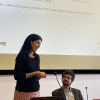Just like any other language, Maltese is influenced by the languages that surround it. A research project at the University of Malta has investigated how the pronunciation of the /r/ sound in Maltese has changed across generations of speakers.
In the world’s languages, /r/ is a particularly “weird” sound. While a sound like /t/ is pronounced similarly in nearly every language that uses it, there are over ten distinct ways that different languages produce /r/.
This study compared speakers over the age of 45 with speakers under 25. In the older group, many acquired Italian informally through exposure to Italian TV, without formal education. Among younger Maltese speakers, however, Italian is no longer learned in this way — the dominant language of media consumption is now English. The researchers asked: Has this shift in language exposure influenced how Maltese speakers pronounce /r/? Given that /r/ is one of the most variable and easily influenced sounds across the world's languages, this seemed a likely candidate for change.
In Maltese, the traditional pronunciation of /r/ is an alveolar trill — a rolled ‘r’ sound like the one in the Spanish word perro (dog). It’s produced by vibrating the tip of the tongue against the ridge just behind the upper front teeth. Italian also uses a trilled /r/, reinforcing this classical pronunciation. English, on the other hand, uses a much softer version: the alveolar approximant, as in red or rabbit.
The results show a clear generational difference. Older speakers generally preferred trilled variants (similar to Italian), while younger speakers favoured approximants (like in English). But this is not a sudden break — the data reveal that the change had already begun with the older generation, who occasionally also use approximants, likely due to increased exposure to English.
Importantly, this shift doesn’t indicate that Maltese is at risk. Languages change all the time. In fact, English itself replaced its trilled /r/ with an approximant a few hundred years ago. The findings show that Maltese, like many other languages, is naturally evolving under new linguistic influences.
The project also explored how these changes affect perception. Some theories in cognitive neuroscience suggest a close link between how we speak and how we understand others — predicting that people will better understand speech that matches their own pronunciation. But this wasn’t supported by the data. Instead, both trill-leaning and approximant-leaning speakers showed a slight preference for trilled /r/ when listening.
Thanks to this research, the University of Malta will host the international ‘r-atics 8’ conference at its Valletta campus on the 22 and 23 April. The event brings together experts from around the world to discuss the peculiarities of /r/-sounds across languages — and now, the changing /r/ of Maltese will take its place in the spotlight.



